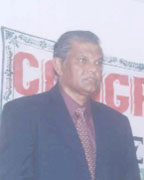Slams PUC for `bias’
The Guyana Telephone and Telegraph Company (GT&T) says its promotions battle with DIGICEL is being contested on an uneven playing field and that the Public Utilities Commission’s (PUC) showed bias against GT&T.

When contacted on this issue, PUC Chairman Prem Persaud told Stabroek News that the PUC is meeting with both GT&T and DIGICEL on the matter of the promotions and the body had nothing to say on it at this time.
And while GT&T Chief Executive Officer Joe Singh is careful to avoid the creation of a nexus between the ongoing monopoly talks between GT&T and government, it is clear that the pending outcome of those discourses has added to the condition of ‘bad blood’ in the telecommunications sector. Government has made no secret of its wish that the GT&T monopoly of the country’s international telecommunications service come to an end – an inevitability which GT&T has long accepted – though critics have taken unkindly to the often public and vitriolic manner in which the administration has prosecuted its concern. DIGICEL, perhaps understandably, has been far from indifferent to the prevailing environment and to the ongoing monopoly talks and has made public its own keenness to see the monopoly come to an end.
GT&T’s concern that the PUC is granting the company less than ‘a fair shake’ in its advertising battle with DIGICEL is clearly seen within the company as part of a continuum of ‘bad times.’ So concerned is GT&T over its view that the actions of the PUC are hurting the commercial interests of the company that it has moved to the courts, charging the PUC with prejudice.

To back his claim that the PUC refuses to treat with GT&T “within the framework of a level playing field,” Singh cited the latest falling out between the two. “The last ‘promo’ that we had which started in October was designed to cut overseas calls by 50 per cent to allow for more use of our land lines…We did not offer this service to our mobile customers; we offered it only to our land line operators….so that in our view it was not going to impinge on anything that our competitor was doing. But what happened? The PUC accepted our arguments for the promo, approved it and it went into effect in October 1 for three months. In the second month, because of complaints or representation made by the competitor the PUC instructed that we terminate the promo at the end November, notwithstanding its earlier approval. We complied.” By comparison, Singh says, GT&T’s objection to DIGICEL’s free-after-three promotion, which, he argues, pushes cellular service rates ‘below the floor’ set by the PUC, has failed to bring an end to the running of the promo, “even though we have been told that the competitor has been instructed to stop it. They have not.”
Senior DIGICEL officials have strenuously denied that they have received any instruction from the PUC to ‘pull’ the ‘promo’.
It is issues like these that lie at the heart of Singh’s charge of prejudice against the PUC. “It is passing strange that the moment we received instructions to terminate our ‘promo’ a (DIGICEL) billboard went up the next day in the YWCA compound.”
Singh believes that occurrences like this point unerringly to the unevenness of the playing field. “How can you criticize us for high overseas rates in circumstances where a billboard goes up in the YWCA compound the day after we are instructed to remove the ‘promo.’”
Singh is blunt about GT&T’s ‘beef’ with the PUC. “The degree of fairness with which the regulatory agency is dispensing its decisions is biased against us. There is no question about this,” he insists.
GT&T’s Director of Rate Making Gene Evelyn shares Singh’s frustration over what he too regards as the biased posture of the PUC. On the issue of Singh’s claim that PUC is yet to take measures to back its instruction that the free-after-three ‘promo’ be stopped Evelyn says: ‘The fact is that they (the PUC) have done nothing. All that they have continued to do is to repeat to us that they have said to DIGICEL that this ‘promo’ needs to be stopped.”
So certain is GT&T of the validity of its charge of bias that Evelyn says that the company has now moved to the courts to seek restitution there. “Based on the most recent withdrawal of approval in the case of the international rate reduction we actually think that we have a basis to accelerate the hearing of the court matter.” He says that after legal action had been taken on the basis of earlier acts of alleged prejudice there had been a subsequent occurrence. “We believe that a basis now exists to ask the courts to move expeditiously to address this matter since it continues to hurt us,” Evelyn says.
And according to Singh little if anything has changed despite the telephone company’s protestations. “We have written to both the PUC and the Minister responsible for telecommunications on this matter,” Singh says.
Referring to what he repeatedly describes as the prejudice being applied by the PUC, Singh declares: “That is the nature of the beast. That is the nature of the environment in which we are operating: this company in which the government owns 20 per cent and which has done, in my estimation, tremendously well compared with other utilities which were once privatized and are now back under state control.
This utility has performed and continues to perform in spite of all the challenges and continues to invest in the country in a very bullish way.”
At the core of Singh’s argument is the view that GT&T “deserves better” given what he says has been the impact that its investment has had on the country’s telecommunications infrastructure. Singh says that he seriously doubts that any other overseas investor would have done what Atlantic Tele Network did at the time that they did it.
“Everybody,” he says, “is piggy-backing on the infrastructure that we have built, that we have invested in. That, from a national interest standpoint ought to count for something.” Guyana, he says, would probably have remained in the proverbial dark ages of telecommunications for a while longer but for the timeliness of the ATN investment.
